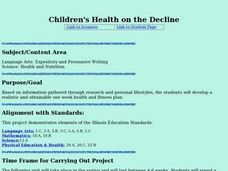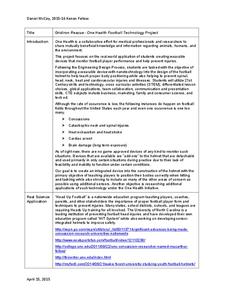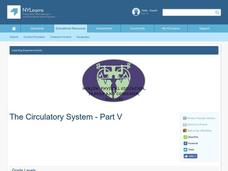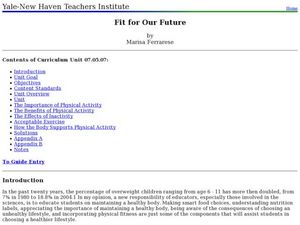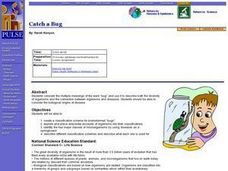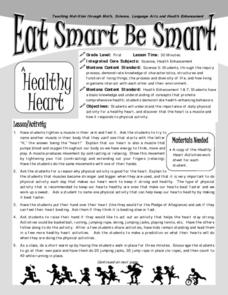Curated OER
Allowing Students to Explore Simple Physics and Marketing in English Class
Scientific method, linear measurements, friction, inertia. Imagine learning scientific vocabulary in an ELA class. Before researching and developing a presentation about simple machines, class members build a common, but decidedly...
Curated OER
Children's Health on the Decline
Demonstrate the importance of children's health with this cross-curricular lesson, which includes elements from health and science as well as expository writing. Middle schoolers develop realistic and obtainable one week health and...
Curated OER
Industrialization, Chemicals and Human Health - Math
Learners review the units of the metric system, and practice estimating measures before actually converting between the two systems of measurement. They participate in activities to visualize a concentration of one part per million....
Curated OER
The Circulatory System - Part II
First graders recognize that the heart muscle requires food. Students observe a Venn Diagram to identify foods that are good for them. Students provide one ingredient to make healthy heart soup.
Curated OER
Teen Driving: Skills, Responsibilities and Reactions
As an introduction to the skills required for and responsibilities of driving, pre-teens and teens engage in a series of activities, chart their response times, and analyze how variables effect these reaction times. Class groups use the...
Kenan Fellows
Gridiron Rescue: One Health Football Technology Project
Helmets not included! Scholars brainstorm adjustments and sensors to football helmets in an engineering design project to help prevent injuries, such as concussions and spinal injuries.
G. Turrell
Science Activity 2: Light & Sound
Little learners experiment with sunlight and map out how light travels. Using a mirror and slotted card, they find out about items that can reflect or absorb the light. They experiment with a variety of materials to find out how light...
PBS
Stories of Painkiller Addiction: Myth or Fact
Are opioids the most abused drug after marijuana? How hard is it for young people to obtain painkillers without a prescription? Middle and high schoolers explore the growing epidemic of opioid addiction with a lesson that prompts them to...
Scholastic
Recovery From Drug Addiction
Are there factors that put some individuals at a higher risk for drug addiction than others? Learn more about the risk factors that may make some people more susceptible to addiction, as well as protective factors that help prevent...
University of Rhode Island
Food Safety Smart Curriculum
This is a must-have resource with everything you'll need for studying food safety with your pupils. From handwashing scorecards and cleaning kitchen surfaces to navigating the world of microbes and food-borne illnesses, here you'll...
Baylor College
How Much Water Do Humans Need?
Physical or life science learners measure the amounts of water eliminated by intestines and the urinary system, and the amounts lost via respiration and perspiration. In doing so, they discover that the body's water must be replenished...
Curated OER
Circulatory System
Learners rotate through various physical activities checking their carotid pulse after each. This activity will give knowledge to students about health behaviors and understanding the exercise aspect of growth and development.
Curated OER
Fit for Our Future
Students understand the importance of physical fitness as part of a healthy lifestyle. In this health lesson students create a display and presentation about what they learned.
Curated OER
Fertilizers, Pesticides and Health
Learners apply real data to create and calculate algebraic equations. Students create a visual to represent the concentration for one part per million and apply unit analysis to verify measurement computations. Learners define the use...
Curated OER
The Best Place in the United States to Live
Students, working in small groups, analyze information provided in U.S. maps to make a logical determination of the best place to live in the United States in regards to natural and human-made hazards. Then, working individually, they...
Curated OER
Arsenic and Human Health
Ninth graders concentrate on arsenic poisoning as an example of the connections among health, geography, and geology as they develop a persuasive presentation about the dangers of arsenic in the drinking water, targeting a specific...
Baylor College
Activity and Exercise
Leave it to the classic jump rope to get your class excited about physical activity! Your class will begin by discussing the benefits of jumping rope as a form of exercise and learning a few different types of jumps. Then in groups of...
Baylor College
Fuel for Living Things
During a three-part lesson, learners make a cabbage juice pH indicator and use it to analyze the waste products of yeast after feeding them with sugar. The intent is to demonstrate how living organisms produce carbon dioxide, which is...
Baylor College
How Can We Find Out What Is in Water?
Using paper chromatography, water watchers discover that several substances might be dissolved even though they aren't visible. In this case, you will prepare a mixture of three different food colorings for them to experiment with. A...
Curated OER
Are We Couch Potatoes or Busy Bees? Data Analysis of Physical Activity in School
Young scholars study practical data analysis within the constraints of the scientific method. In this data lesson students collect and enter data into a computer spreadsheet then create graphs.
Baylor College
What Dissolves in Water?
One of water's claims to fame is as the universal solvent. Young physical scientists experiment to discover which materials dissolve in this special compound. You could never be more prepared for teaching this instructional activity than...
Baylor College
Lungometer
Life science learners construct lung-o-meters from gallon-sized milk jugs and then measure their lung capacities. For older students, have them graph the vital lung capacities of each person in the class. Cross-curricular pieces are...
Montana Office of Public Instruction
Eat Smart Be Smart
Get children's blood pumping with this primary grade activity on the human heart. After learning about the important role this muscle plays in the human body, students monitor their heart rates and discover the importance of staying active.
Carnegie Mellon University
Consumer Preferences in Lighting
What is a watt? This tongue-twisting, mind-bending question and others are answered through this instructional activity on the different lighting options available. With the support of a PowerPoint, teach your physical science class...



